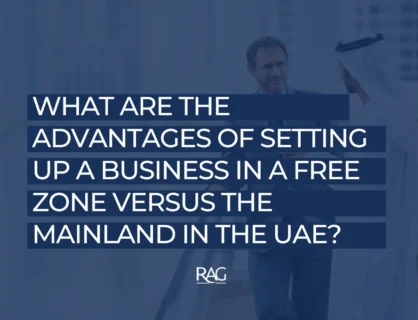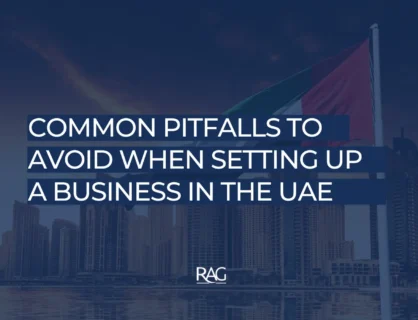Common Pitfalls to Avoid When Setting Up a Business in the UAE
The UAE has become one of the most attractive business hubs in the world, drawing entrepreneurs, startups, and multinational corporations alike. Its strategic location, tax-friendly environment, world-class infrastructure, and cosmopolitan lifestyle make it a magnet for business growth and innovation. But while the opportunities are vast, setting up a business in the UAE is not without its challenges.
Many newcomers, despite their enthusiasm and resources, stumble on common pitfalls that can delay their launch, inflate costs, or even jeopardize their entire venture. If you want your business setup journey to be smooth and successful, it’s crucial to understand these potential traps and how to steer clear of them.
Let’s dive deep into the most common pitfalls and how you can avoid them.
1. Inadequate Market Research: Don’t Assume, Know
One of the biggest mistakes entrepreneurs make is rushing to set up without fully understanding the UAE market. The UAE is unique: a melting pot of cultures, a mix of local Emirati consumers and diverse expatriates, each with different tastes, spending habits, and expectations.
For example, a product or service that works well in Europe or Asia might not resonate here due to cultural differences or purchasing power variations. Likewise, the UAE’s consumer base places high value on quality, brand reputation, and customer experience.
How to avoid it:
- Invest time and resources into thorough market research.
- Use surveys, focus groups, competitor analysis, and digital tools to understand your target customers’ preferences, pain points, and buying behaviors.
- Tailor your product, pricing, and marketing strategy to fit the local context.
2. Choosing the Wrong Jurisdiction: Mainland vs. Free Zone vs. Offshore
The UAE offers a variety of business jurisdictions, each with distinct advantages and limitations:
- Mainland: Allows you to trade directly with the local market and government entities but often requires a local sponsor holding 51% ownership (though recent reforms have eased this in many sectors).
- Free Zones: Offer 100% foreign ownership, tax benefits, and simplified setup processes but restrict your ability to trade directly within the UAE market without a local distributor.
- Offshore: Ideal for holding companies and international trading but not for conducting business within the UAE.
Choosing the wrong jurisdiction can limit your business activities, increase costs, or create legal complications.
How to avoid it:
Clearly define your business goals and activities upfront. If you want to serve the local UAE market directly, a mainland license might be necessary. If your focus is international trade or e-commerce, a free zone could be more suitable. Consulting with setup experts can help you make an informed choice aligned with your business model.
3. Overlooking Compliance and Legal Requirements
The UAE’s regulatory environment is comprehensive and evolving. From Economic Substance Regulations (ESR) to Anti-Money Laundering (AML) laws, VAT, and now corporate tax, compliance is more important than ever.
Failing to meet these requirements can lead to hefty fines, license suspension, or even forced closure.
How to avoid it:
Stay informed about all relevant regulations affecting your industry. Register for VAT if your turnover exceeds the threshold, file ESR notifications on time, and maintain transparent accounting records. Working with legal and financial advisors who specialize in UAE law ensures you remain compliant and avoid surprises.
4. Underestimating Costs and Financial Planning
Many entrepreneurs underestimate the true cost of setting up and running a business in the UAE. Initial setup fees, licensing costs, office rent, visas, insurance, employee salaries, and operational expenses can add up quickly.
Without a realistic budget and cash flow plan, you risk running out of funds before your business gains traction.
How to avoid it:
Create a detailed financial plan covering all one-time and recurring expenses. Include contingencies for unexpected costs such as delays in licensing or additional regulatory fees. Factor in marketing and hiring costs, and ensure you have sufficient working capital to sustain operations until your business becomes profitable.
5. Choosing the Wrong Local Partner or Sponsor
For mainland businesses, a local sponsor or service agent is often required. Selecting the wrong partner can lead to conflicts over control, profit sharing, and decision-making.
There have been cases where entrepreneurs lost control of their companies due to poorly drafted agreements or unscrupulous sponsors.
How to avoid it:
Perform thorough due diligence before finalizing any partnership. Choose sponsors with a trustworthy reputation and aligned interests. Draft clear, legally binding agreements outlining roles, responsibilities, profit sharing, and exit clauses. Consider professional sponsorship services that offer protection and transparency.
6. Selecting an Inappropriate Business Activity or License
The UAE offers thousands of business activities under different license categories—commercial, professional, industrial, and more. Choosing the wrong activity or license can restrict your operations, cause legal issues, or require costly amendments later.
For instance, if you want to provide consultancy services but opt for a commercial license, you may face regulatory hurdles.
How to avoid it:
Work with business setup experts to select the correct license and activities that match your business plans. Review the Department of Economic Development (DED) or free zone authority guidelines carefully, and ensure your license covers all intended activities.
7. Incomplete or Incorrect Documentation
The UAE’s licensing process is document-heavy, requiring notarized contracts, passport copies, business plans, and more. Errors or missing paperwork can delay approvals or cause rejection.
How to avoid it:
Prepare your documents meticulously. Use checklists provided by licensing authorities, and seek professional help to review and submit your paperwork. Timely and accurate documentation expedites your setup process.
8. Ignoring Visa and Immigration Rules
Visas are essential for you, your employees, and dependents. Each jurisdiction has its own visa quotas, processing times, and eligibility criteria.
Misunderstanding visa requirements can delay hiring, disrupt operations, or cause legal complications.
How to avoid it:
Plan your visa needs early. Understand how many visas your license allows, the process for obtaining them, and the documents required. Work with PRO (Public Relations Officer) services or consultants to manage visa applications efficiently.
9. Neglecting Local Culture and Business Etiquette
The UAE’s business culture is a blend of traditional Arab customs and modern global practices. Respect, patience, and relationship-building are highly valued.
Failing to appreciate local customs, such as prayer times, Ramadan observances, or negotiation styles, can harm your reputation and partnerships.
How to avoid it:
Take time to learn about UAE culture and business etiquette. Attend networking events, engage with local chambers of commerce, and build genuine relationships. Showing respect and cultural sensitivity opens doors and fosters trust.
10. Trying to Do Everything Alone Without Expert Help
Many entrepreneurs attempt to navigate the UAE’s complex setup process solo, only to find themselves overwhelmed by regulations, paperwork, and unexpected hurdles.
This can lead to delays, increased costs, and frustration.
How to avoid it:
Partner with experienced business setup consultants who understand the UAE market inside out. They can guide you through every step, from choosing the right jurisdiction and license to handling legal compliance, visas, and office setup. Their expertise saves you time, money, and stress.
Don’t Rush the Process
While the UAE offers fast-track options, setting up a business is a significant commitment. Rushing can cause oversights and costly errors.
Take the time to plan carefully, seek advice, and build a solid foundation for your venture.
Your Trusted Partner for Business Setup in the UAE
Setting up a business in the UAE is a fantastic opportunity, but it requires careful planning and awareness of potential pitfalls. From choosing the right jurisdiction and license to understanding cultural nuances and legal compliance, every detail counts.
With over a decade of experience as business setup experts in the UAE, we’ve helped countless entrepreneurs and companies navigate this complex landscape smoothly and successfully. Whether you’re launching a startup or expanding an established brand, we can guide you through the entire process—from market research and licensing to visas and office space—ensuring your business is built on a strong foundation.
Ready to turn your business vision into reality in the UAE? Let’s work together to make your setup journey seamless and your success inevitable.
Blogs

What Are the Advantages of Setting Up a Business in a Free Zone Versus the Mainland in the UAE?

Common Pitfalls to Avoid When Setting Up a Business in the UAE

How to Identify Your Perfect Niche and Stand Out from the Competition in 2025 in Dubai

How to craft a bulletproof business continuity plan in Dubai in 2025

How Business Setup Consultancies Can Save You Time and Money in Dubai

How to Keep Your Restaurant Busy During Ramadan in Dubai

How to Build a Smart Home Automation Business in Dubai



